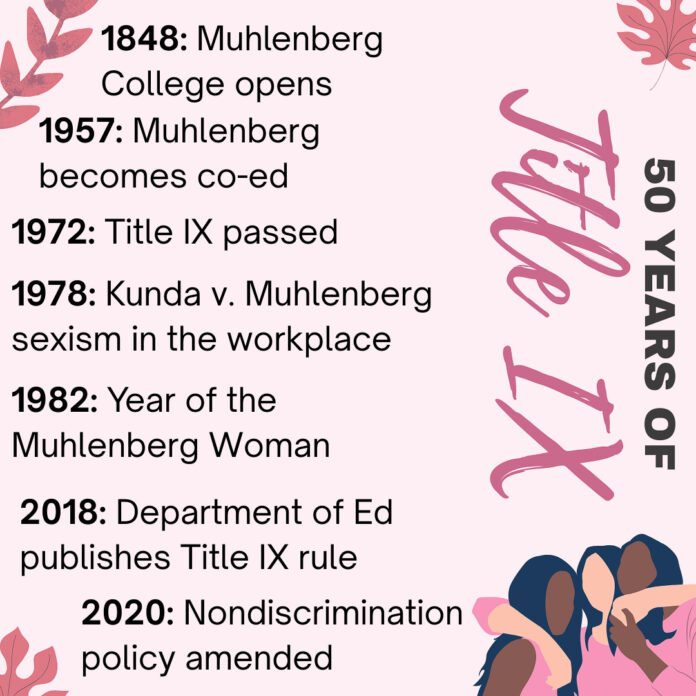Title IX of the Education Amendments of 1972 prohibits discrimination based on sex in educational programs. It requires that people receive equal opportunities, financial assistance and educational benefits regardless of sex. It also protects against discriminatory practices based on sex such as sexual harassment. It has been 50 years since this law was first enacted, but it is clear that there is still a long way to go in terms of reaching gender equality. On Thursday, Oct. 27, a variety of organizations on campus invited social justice educator Jen Fry to share what changes individuals can make within themselves to make a difference, establishing that “If you don’t see it then you need to do it.” Being a DII athlete and veteran volleyball coach for 15 years, Fry witnessed firsthand that coaches were not stressing diversity, equity and inclusion the way they should be. This led her to focus on teaching student-athletes and administrators alike about what inclusivity means through the lens of sports education.
In her seminar, Fry explained how carrying out the ideals of Title IX starts with individuals’ everyday behavior. The session was highly interactive given Fry’s indication that a major part of growth is meeting and leaning on others. Audience members spoke to one another with the many “Pair and Shares” throughout the presentation and were encouraged to share their ideas with the whole group. “If I see you being the lonely llama, I will ask you to leave,” joked Fry, who maintained a light-hearted environment while stressing the importance of uncomfortability in exploring ways people can improve themselves.
Two key topics Fry focused on were self-advocacy and the weaponization of words. Fry asked a variety of questions that made audience members reflect on what has impacted their own self-advocacy and their experiences of others self-advocating, how they use certain words and how certain words are used against them. Specific questions for the audience surrounded how they develop boundaries, have been taught to advocate for themselves, behave in conflict, have had their self-advocacy limited and have limited the self-advocacy of others through the weaponization of words. As she asked these questions, Fry encouraged her audience to think about what it is about their past experiences that may affect their behavior and what they can do to be better both for themselves and for others in the future. She says, “You have to unlearn stuff in order to be better. If you think that you can’t peel back the layers in order to be a better person, you are dead wrong. You can’t say ‘Well, I don’t have to think about my grandparents or my parents, I can just start learning to be better,’ because you’re never [going to] know what you need to fix to be better.”
“You’re not gonna learn about your biases or the blindspots you have until you start to peel back the layers.”
Jen Fry
Fry stressed the importance of self-advocating in a respectful manner, saying “I will tell you, you never deserve to be cussed out… what gives you the right to talk to someone else like that just because you’re angry?” Questions such as “am I scared to make people mad” and “do I want everyone to like me” were among those asked in the self-advocacy portion of the presentation. Fry explained, “If you’re scared to make people mad, you’re gonna put yourself in very dangerous positions. We’re so worried that we will make people mad that we don’t advocate for ourselves… You see in highly, highly male-led organizations, the women in there tend to protect because they’re like…’I worked so hard to get here, I need to find a way to keep myself in this position,’ so they’ll protect and protect the institution.” Fry teaches that knowing how to self-advocate and advocate for others prevents issues that fall under Title IX from going under the radar.
Fry went on to establish how the weaponization of words is an act of silencing. Words such as “angry,” “aggressive,” “crazy” and “bossy” are among many that are used against women to stop them in their tracks when they are being assertive. The idea that women who self-advocate are viewed negatively calls for both institutional and individual change, but what does that change look like?
“Students get mad when they don’t see change fast, and I will tell you this, if you see change fast, you’re being lied to…change has to happen so slow because you’re not just changing the wording, but you’re changing how people view the wording. The slower the better, and that sounds so weird, but you should be able to see the progress in it. If [the institutions say] ‘well, we can change this overnight,’ it’s not true, and all they’re doing is really waiting for you to graduate.” Fry continued, “You have to start asking questions that people will give you real answers to, and the first thing is if people are afraid to give the real answers, then that should be a part of the problem… can your students give real answers without repercussions?”
“As students, are you giving actual tangible things you want to see fixed?”
Jen Fry
Jen Fry’s tribute to 50 years of Title IX clearly struck a chord with Muhlenberg audiences and set the precedent for how necessary these events are. “It was very educational, and I learned a lot about myself, which I wasn’t expecting to happen,” says Emily Orlich ‘24. “I thought it started some great conversations and I hope we have more events like it at Muhlenberg.”
Samantha Tempkin ‘25 is a theatre and media & communication double major and is thrilled to be joining the Weekly’s staff as an Assistant News Editor! She is also the co-president of KPC, Muhlenberg’s K-Pop club. When she is not writing for the paper, Sam loves singing, dancing, listening to music, seeing Broadway shows, watching Marvel movies, and hanging out with friends!























